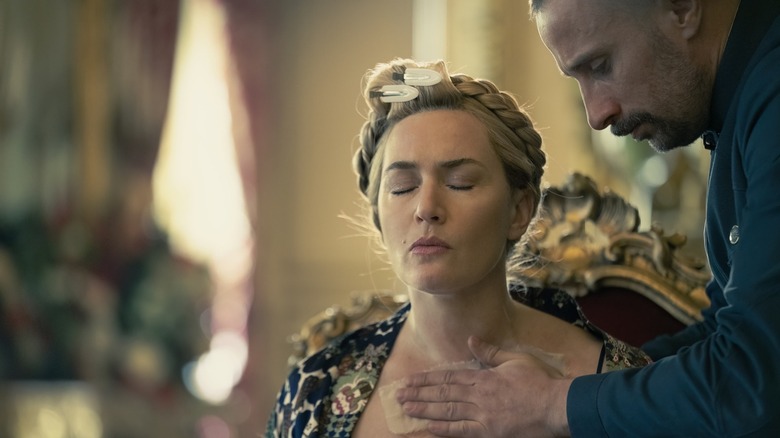Kate Winslet's Role In The Regime Had Her Taking An In-Depth Look At Trauma
If you're making a list of the greatest film acting debuts of all time, Kate Winslet's unnervingly ecstatic portrayal of Juliet Hulme in Peter Jackson's "Heavenly Creatures" better be at or near the top of the list — and you should absolutely tether it to co-star Melanie Lynskey's startling debut as Pauline Parker in the same fantastic movie. You can't set the bar any higher than this, and all the two actors have done over the last 30 years is meet or surpass our expectations.
While Lynskey ultimately found her groove as a versatile and rousingly effective character actor, Winslet's career skyrocketed to superstardom in 1997 when she landed the role of Rose in James Cameron's disaster epic "Titanic." Her red-hot romance with Leonardo Di Caprio's dashing Jack granted her cinematic immortality, at which point she was faced with the daunting challenge of living up to mainstream moviegoers' expectations.
Winslet could've been the next Elizabeth Taylor, and Hollywood was certainly willing to give her the opportunity to go that glamorous route. But she turned down numerous high-profile films (including "Shakespeare in Love") in favor of parts that allowed her to burrow and grow as an artist. This was clearly the right call. Though the movies didn't always work, it was thrilling to watch Winslet push herself in films by master filmmakers like Jane Campion ("Holy Smoke") and Philip Kaufman ("Quills"). This strategy paid off smashingly with her heart-shattering turn as Clementine Kruczynski in Michel Gondry's "Eternal Sunshine of the Spotless Mind."
Since then, Winslet has only continued to burrow. Of late, she's delivered her most emotionally and psychologically complex work on HBO in Todd Haynes' "Mildred Pierce" and Brad Ingelsby's "Mare of Easttown." How does she keep clearing that dizzyingly high bar she set as a teenager? She prepares. She studies. And this hard work is paying off yet again in her latest HBO series "The Regime."
An authoritarian molded by trauma (and traumatized by mold)
Elena Vernham in "The Regime" is a classic Winslet protagonist. Beneath her gleaming exterior, Elena, the authoritarian ruler of a fictional European country teetering on collapse, is crumbling apart. The former physician has turned into a raging hypochondriac. She's convinced the moldy interior of her residence is slowly killing her. It's a deeply unsettling spiral that leaves her vulnerable to an ouster.
We're just one episode into this hugely intriguing melodrama, but Winslet's stunning ability to veer from steely stateswoman to fragile child has us hooked for the six-episode duration. To hit these difficult notes as a performer, Winslet called upon experts to help her understand people plagued with Elena's condition. As she explained in an interview with IndieWire:
"I did actually work with a neuroscientist and a psychotherapist to try and understand trauma a bit better and how that can manifest itself in people's bodies and lives and how they move and how they speak. Because I wanted to make sure that I was rooting her in some kind of reality. It's really looking at her childhood, where her trauma began, and how that has stayed with her and how it absolutely impacts every single one of her close personal relationships."
She probably didn't have to go this deep prior to playing a woman on a blind date with a man who has testicles dangling from his chin in "Movie 23," but, in most cases, this is the kind of commitment that keeps Winslet at the acme of her profession. Everything she does is a must-see.
New episodes of "The Regime" drop Sundays on Max.

